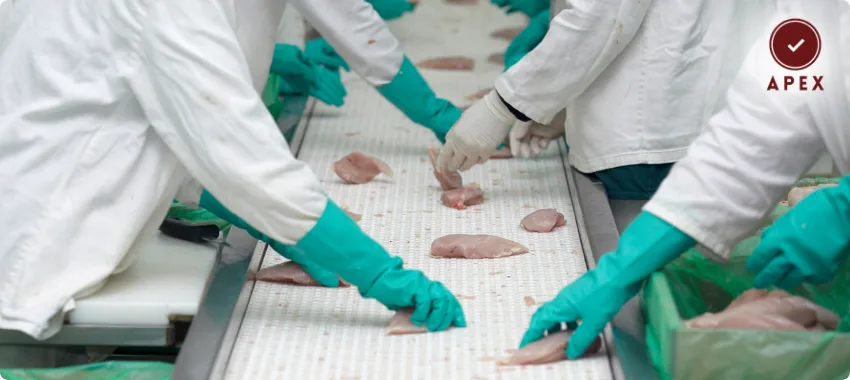HACCP Certification in Ajman

HACCP (Hazard Analysis and Critical Control Points) is a worldwide accepted system for managing food safety that focuses on detecting and controlling safety hazards. The rapidly expanding food industry of Ajman, including its restaurants, manufacturing units, catering services, and export businesses, requires HACCP certification as a mandatory standard. The UAE regulatory bodies, together with the Ajman Municipality, strongly promote HACCP practices to achieve superior food hygiene standards while decreasing the likelihood of food-transmitted diseases.
HACCP certifications strongly support the food safety and quality assurance initiatives of the UAE, and help organizations pursue their legal requirements and uphold product safety standards while developing consumer confidence. HACCP certification is necessary for the businesses that operate in the Ajman Free Zones and exporters since they will be entering the international markets, where many rely on expert HACCP certification consultants.
The Importance of HACCP Certification in Ajman
- Regulatory Compliance: Show compliance with laws of food safety and municipal regulations in the UAE.
- Foodborne Illness Prevention: Determines and controls biological, chemical, and physical hazards that exist in food.
- Brand Reputation: The implementation of HACCP standards facilitates both brand reputation enhancement and the creation of safe, premium food offerings for consumers.
- Operational Efficiency: Improves through this system because it simplifies food safety procedures and reduces waste while enhancing quality control.
- Market Access: Satisfy the needs of key buyers, distributors, and export markets.
- Public Health Standards: Businesses in Ajman implement HACCP systems to prove their dedication to safety and public health standards while drawing international business associations and investment partnerships.
Who Should Get HACCP Certified in Ajman?
- HACCP certification applies to facilities that process meat, poultry products, and baked goods, as well as those that produce ready-to-eat foods.
- Establishments that provide food preparation and service in hotels and restaurants are included.
- Food services dedicated to airlines, as well as corporate and institutional clients, benefit the most from HACCP certification.
- This sector includes warehouses and logistics companies that handle perishable food items.
- The food sector includes two main segments: first, retail spaces that sell fresh or packaged foods, and second, supermarkets that operate under the same criteria.
How to Get HACCP Certified in Ajman
- Initial Assessment & Gap Analysis: Evaluate existing food safety practices. The assessment process must determine what areas fail to meet requirements set by HACCP standards, often supported by HACCP gap analysis consultants.
- Hazard Analysis & Plan Development: Identify potential hazards in each stage of food production or service. Every HACCP system requires defining areas known as Critical Control Points, which specifically indicate locations where hazards can be stopped or minimized.
- System Implementation: Develop procedures for monitoring CCPs. Define corrective actions for non-compliance. Establish verification activities and documentation, guided by food safety management system consultants.
- Staff Training & Awareness: Train employees on HACCP principles, hygiene practices, and their responsibilities. Build a food safety culture within the organization.
- Internal Audit & Management Review: The organization will need an audit inspection from an accredited certification body like Apex SC. Achieve HACCP certification upon successful evaluation on stage 1 and stage 2 audit. The continuous preservation of documentation while conducting improvement activities ensures organizations can keep their certification active and meet their compliance requirements.
- External Audit & Certification:The organization will need an audit inspection from an accredited certification body like Apex SC. Achieve HACCP certification upon successful evaluation on stage 1 and stage 2 audit. The continuous preservation of documentation while conducting improvement activities ensures organizations can keep their certification active and meet their compliance requirements.
Apex SC does not offer ISO consultancy services. Organizations may choose any ISO consultant of their preference. Apex SC provides impartial, accredited ISO certification audits in compliance with international accreditation requirements.
HACCP Certification in Ajman with APEX SC
The collaboration with us will result in your receiving end-to-end support in terms of the assessment to certification. Our expert team is familiar with the food safety issues in the market of Ajman and draws up the solutions that are oriented on the international standards of HACCP as well as local requirements.
We provide:
- Unbiased decisions
- Cost effective solutions
- Hassle-free certification assistance
- Transparency in our Audits
We aren’t only here to help you achieve certification; as a dedicated certification body, we are here to ensure your food safety systems remain effective, compliant, and credible to your customers.
